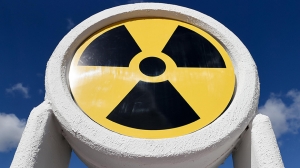Plans to step up radiation monitoring in Belarus

MINSK, 25 October (BelTA) – Plans are in place to increase radiation monitoring in Belarus, BelTA learned from Tatiana Kononchuk, Head of the Central Office for Ecological Policy, International Cooperation, and Science of the Belarusian Natural Resources and Environmental Protection Ministry, during the roundtable session “National radiation monitoring. Modern challenges and prospects”.
Tatiana Kononchuk said: “At present radiation is monitored at 120 observation points across Belarus. Apart from that, due to the construction of the Belarusian nuclear power plant another ten automated background radiation monitoring systems have been deployed. All of it allows tracking the radiation situation in our country and in neighboring countries in online mode. In the future we intend to step up radiation monitoring by installing modern equipment. We intend to enhance the equipment for data processing, too.”
The national environmental monitoring system has turned 30 this year. The system went through quite a serious development history in this period. “Radiation monitoring changed more often than other components. It became most relevant after the catastrophe at the Chernobyl nuclear power plant. Hundreds of observation points were set up back then. I'd like to note that thanks to observation and monitoring we managed to overcome multiple consequences of the Chernobyl catastrophe within a short period of time. We've managed to resume life in these territories and take care of the population's health.”
In her words, within the framework of international technical aid the National Center for Hydrometeorology, Radioactive Contamination Control, and Environmental Monitoring (Belhydromet) is implementing a project together with the International Atomic Energy Agency (IAEA). The project pays close attention to radiation monitoring. The government program on environmental protection and sustainable use of natural resources, which will end in 2025, also helps with that.
“On the whole, the radiation situation across Belarus is satisfactory. Control has been stepped up in the territories that have been subjected to radioactive pollution. This work proceeds within the framework of the government program on overcoming consequences of the Chernobyl catastrophe among other things,” the head of the Central Office for Ecological Policy, International Cooperation, and Science of the Belarusian Natural Resources and Environmental Protection Ministry said.













